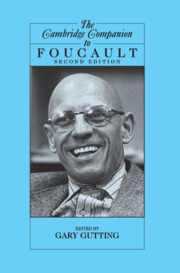Book contents
- Frontmatter
- Introduction Michel Foucault: A User’s Manual
- 1 Foucault’s Mapping of History
- 2 Foucault and the History of Madness
- 3 The Death of Man, or Exhaustion of the Cogito?
- 4 Power/Knowledge
- 5 Ethics as Ascetics: Foucault, the History of Ethics, and Ancient Thought
- 6 Michel Foucault’s Ethical Imagination
- 7 The Analytic of Finitude and the History of Subjectivity
- 8 Foucault’s Encounter with Heidegger and Nietzsche
- 9 Foucault and Habermas
- 10 Foucault’s Relation to Phenomenology
- 11 Against Interiority: Foucault’s Struggle with Psychoanalysis
- 12 Foucault’s Modernism
- 13 Queering Foucault and the Subject of Feminism
- Bibliography
- Addendum to Bibliography, 1993–2005
- Index
7 - The Analytic of Finitude and the History of Subjectivity
Published online by Cambridge University Press: 28 August 2006
- Frontmatter
- Introduction Michel Foucault: A User’s Manual
- 1 Foucault’s Mapping of History
- 2 Foucault and the History of Madness
- 3 The Death of Man, or Exhaustion of the Cogito?
- 4 Power/Knowledge
- 5 Ethics as Ascetics: Foucault, the History of Ethics, and Ancient Thought
- 6 Michel Foucault’s Ethical Imagination
- 7 The Analytic of Finitude and the History of Subjectivity
- 8 Foucault’s Encounter with Heidegger and Nietzsche
- 9 Foucault and Habermas
- 10 Foucault’s Relation to Phenomenology
- 11 Against Interiority: Foucault’s Struggle with Psychoanalysis
- 12 Foucault’s Modernism
- 13 Queering Foucault and the Subject of Feminism
- Bibliography
- Addendum to Bibliography, 1993–2005
- Index
Summary
In one of his last texts, Foucault defined his philosophical enterprise as an “analysis of the conditions in which certain relations between subject and object are formed or modified, insofar as they are constitutive of a possible knowledge,” or again as “the manner in which the emergence of games of truth constituted, for a particular time and place and certain individuals, the historical a priori of a possible experience.” Despite its eclipse during the genealogical period, the notion of the historical a priori is thus reaffirmed as central by later Foucault. There is, however, an essential modification with respect to its archaeological problematisation: In The Order of Things, the various historical a priori were characterized by specific relations between being and language, relations in which the subject of knowledge did not always or necessarily have a place. The Renaissance episteme was defined by the homogeneity of words and things, and its Classical counterpart by the transparent distance between being and representation, which excluded any positioning for the subject (the missing “place of the king”). Within the archaeological configuration, only the contemporary historical a priori was characterized by the invention of a new position for the subject of knowledge, that of Man, which according to Foucault generated the Analytic of Finitude and ultimately resulted in the “anthropological sleep” criticised at the end of The Order of Things. So although later Foucault refocuses his work around the notion of the historical a priori, he gives the notion a considerable twist whereby the conditions of truth saying are no longer referred back to an implicit connection between being and language, but to the various relations historically established between “modes of subjectivation” and “modes of objectification.”
- Type
- Chapter
- Information
- The Cambridge Companion to Foucault , pp. 176 - 209Publisher: Cambridge University PressPrint publication year: 2005
- 8
- Cited by

